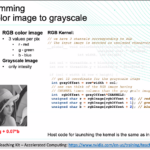Events
Webinar: Streaming Optimised Scientific Software: an Introduction to EESSI
Start
2:00
2024/11/15
End
3:30
2024/11/15
Location
Online
About the talk:
What if you could avoid having to install a broad range of scientific software from scratch on every HPC cluster, laptop, or cloud instance you use or maintain, without compromising on performance?
Installing scientific software for supercomputers is known to be a tedious and time-consuming task. Especially as the HPC user community becomes more diverse, computational science expands rapidly, and the diversity of system architectures increases, the application software stack continues to deepen. Simultaneously, we see a surge in interest in cloud computing for scientific computing. Delivering optimised software installations and providing access to these installations in a reliable, user-friendly, and reproducible way is a highly non-trivial task that affects application developers, HPC user support teams, and the users themselves.
This webinar aims to address these challenges by providing the attendees with the knowledge to stream optimised scientific software installations. For this, we will introduce the European Environment for Scientific Software Installations (EESSI), a collaboration between various European HPC sites & industry partners, with the common goal of creating a shared repository of scientific software installations that can be used on a variety of systems, regardless of which flavor/version of Linux distribution or processor architecture is used, or whether it’s a full size HPC cluster, a cloud environment, or a personal workstation.
We will cover the design and usage EESSI, different ways to accessing EESSI, how to add software to EESSI, and highlight some more advanced features including support for NVIDIA GPUs and facilitating the deployment of pre-release builds of scientific software. We will also show how to engage with the community and contribute to the project.
About the speakers:

Kenneth Hoste
Kenneth Hoste holds a Masters (2005) and PhD (2010) in Computer Science from Ghent University (Belgium). His dissertation topic was “Analysis, Estimation and Optimization of Computer System Performance Using Machine Learning”. Since October 2010, he is a member of the HPC team at Ghent University where he is mainly responsible for user support & training. He is the lead developer of EasyBuild since 2011, a software build and installation framework for (scientific) software on HPC systems, an active contributor in the European Environment for Scientific Software Installations (EESSI) project since 2020, and a partner in the MultiXscale EuroHPC Centre-of-Excellence since 2023. He enjoys (co-)organizing workshops and meetups, like the EasyBuild User Meetings (yearly since 2016) and the HPC, Big Data, and Data Science devroom at FOSDEM (since 2014).
Alan O’Cais
Dr. Alan O’Cais is currently the technical manager of MultiXscale, an EuroHPC centre of Excellence. He previously acted as the Software Manager of E-CAM, an EU Centre of Excellence in computing applications, while at Juelich Supercomputing Centre (JSC). He has previously managed the user software and application environment on the multi-PFlop JURECA hybrid cluster system at JSC. Between 2010 and 2015 he was primarily focused within the LinkSCEEM-2 project helping to develop a Virtual Research Community in Computational Science in the Eastern Mediterranean region. He has held research positions at Trinity College and the University of Adelaide. In 2008 he joined the Cyprus Institute as Scientific Coordinator of the Computation-based Science and Technology Research Centre (CaSToRC). He has worked at the Juelich Supercomputing Centre from 2010 to 2021 and at the University of Barcelona (with an affiliation to CECAM) from 2022.
Pedro Santos Neves
Pedro Santos Neves joined the HPC team at the University of Groningen (The Netherlands) in 2023. While his role focuses on user support, training, and development he is also a contributor to the EESSI project and the MultiXscale EuroHPC Center of Excellence. Previously, he worked as a scientific programmer at the the Groningen Institute for Evolutionary Life Sciences, where he helped researchers design, develop, and maintain scientific software. His background is in Evolutionary Biology in which he holds a Master’s degree (University of Lisbon, 2016) and PhD (University of Groningen, 2024). His doctoral research revolved around the use and development of stochastic models of island community evolution.

